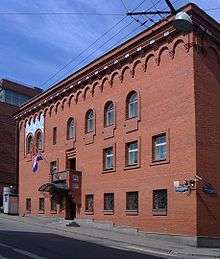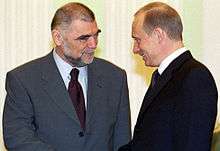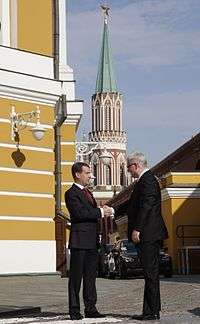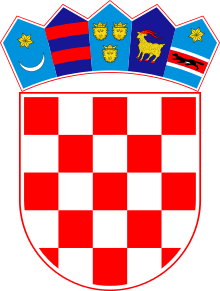Croatia–Russia relations
 | |
Croatia |
Russia |
|---|---|
| Diplomatic Mission | |
| Croatian embassy in Moscow | Russian embassy in Zagreb |
| Envoy | |
| Tonči Staničić | Anvar Azimov |
Croatia–Russia relations (Russian: Российско-хорватские отношения, Croatian: Rusko-hrvatski odnosi) refer to bilateral foreign relations between Croatia and Russia. The countries established diplomatic relations on 25 May 1992. Croatia has an embassy in Moscow and honorary consulates in Kaliningrad, Novosibirsk, and Sochi[1]. Russia has an embassy in Zagreb and honorary consulates in Pula and Split. While geographically not close, Croatia and Russia are both Slavic countries and thus share cultural heritage. Both countries are full members of the Council of Europe and the Organization for Security and Co-operation in Europe. Croatia is a popular tourist destination with Russian travelers in spite of a drastic drop in the numbers after 2014 following the Ukrainian crisis that caused political tension between Russia and the EU, to which Croatia had acceded in 2013.[2] At the end of 2016, Russian experts were cited as judging Russian–Croatian relations to be "cold".[3]
Background
Cultural and personal ties between Russia and persons from the territory of modern Croatia date far back prior to Croatian independence in 1991, such as a trip to Moscow by Croatian Catholic missionary Juraj Križanić in 1659 who later was exiled to Tobolsk in Siberia where he spent 16 years writing manuscripts that promoted Pan-Slavism.
Against the backdrop of the Illyrian movement, a pan-South-Slavist movement, regarded in Croatian historiography as part of the Croatian national revival (Hrvatski narodni preporod), some prominent Croats in the 19th century (the lands of modern Croatia then being largely part of the Austrian Empire, later Austria-Hungary) sought to develop a stronger relationship with Russia because "they saw in Imperial Russia a world power and brotherly Slavic nation from which they had hoped to gain help during the Croatian National Revival."[4]
Croatian nationalist Eugen Kvaternik, who was one of the two founders of the Croatian nationalist Party of Rights, traveled to Russia at the end of 1850s in a bid to enlist help for the cause of the Croatian independence from the Austrian empire, but didn't achieve much.[5] One of the notable figures of the Illyrian movement, Ivan Kukuljević Sakcinski, maintained contacts with a number of Russian academics, slavists, university professors, his contact person with them being the Russian priest at the Russian Embassy in Vienna, Mihail Fjodorović Rajevski. He wrote to Russian scientist Alexander Stepanovich Popov in 1877: "You in Moscow know very well for how long South Slavs had been waiting for salvation. You also know that the eyes of the Slavs are fixed on you and that our hearts are full with you".[6] While Russia′s relations with Serbia deteriorated significantly following the Congress of Berlin (1878), her influence in the Croatian lands increased: the Party of Rights under Ante Starčević adopted a Russophile orientation, a tactic in their bid to achieve Croatian independence of the Habsburgs.[7]
Such aspirations notwithstanding, the visit to Saint Petersburg of Austrian Emperor Franz Joseph and his conference with Nicholas II of Russia in 1897 heralded a secret agreement between the two empires to honour and seek to maintain the status quo in the Balkans.[7][8]
In 1915–1917, several formations of the Royal Croatian Home Guard within the Austro-Hungarian Army, as well as the Common Army′s (K.u.K.) regiments recruited from the Kingdom of Croatia-Slavonia (such as the 79th Infantry Regiment from Otočac), participated in the WWI campaigns fighting against the Imperial Russian Army in Galicia and Bukovina; they incurred heavy losses, especially in June 1916, during the first phase of the Russian offensive in 1916.[9][10][11]
During the period between the world wars, in the 1920s–1930s, the Kingdom of Yugoslavia, which had incorporated the Croatian lands, hosted a sizable part of the White exiles who fled Soviet Russia during the Russian Civil War. Along with Serbia, Croatia accepted thousands of mainly indigent[12] Russian refugees led by General Pyotr Wrangel and Metropolitan Anthony Khrapovitsky. Until his death in 1936, Metropolitan Anthony was regarded as a leader of all the Russian refugees in Yugoslavia,[13] a country whose staunchly anti-Soviet, anti-Communist monarchist regime refused to establish diplomatic relations with the USSR until June 1940. Zagreb and some other Croatian cities had numerous military, religious, educational and professional Russian establishments, all of which were closed down in May 1945, after the imposition of the Communist regime in Croatia. Most of those few Russians who had failed to leave for the West, were subjected to reprisals and prosecution, or forced to leave for the USSR.[14][15]
During the German-Soviet War (June 1941–May 1945), the 369th Croatian Reinforced Infantry Regiment (a unit of Germany′s 100th Jäger Division of the German Army, under Croatian officers Viktor Pavičić and later Marko Mesić) distinguished itself in the Battle of Stalingrad, but surrendered along with the German 6th Army in early February 1943. At the end of the war in Europe, units of the Red Army′s 3rd Ukrainian Front fought in some Croat-populated territories, then mostly outside the borders of the pro-Germany Independent State of Croatia (the NDH). The USSR had otherwise actively supported Tito's Yugoslav Partisans — against Germany, the NDH, and allies thereof, as well as Chetniks — since 22 June 1941 when Germany attacked the Soviet Union. In November 1944, during the Battle of Batina (now in Croatia), 1,237 men of the Red Army were killed fighting against the combined Axis forces. On the other hand, the 1st Cossack Cavalry Division and the 2nd Cossack Cavalry Division merged into the XV SS Cossack Cavalry Corps in February 1945 under German command and manned mainly by Cossacks from the USSR, from 1943 conducted successful tactical operations in Croatia against both Communist partisans and — from late 1944 — the Red Army.[16][17][18] The fighting between the Cossack forces under Helmuth von Pannwitz and the Red Army in northern Slavonia in December 1944 is viewed by Russian historians as last battles of the Russian Civil War.[18] Also fighting on the territory of the NDH from October 1944 — against the Communist partisans and the Soviet troops — were the retreating units of the Russian Protective Corps, whose commander, Russian general Boris Shteifon, died in Zagreb on 30 April 1945.
In November 1945, the Socialist Federative Republic of Yugoslavia was proclaimed, Croatia being one of its constituent republics. The USSR maintained a consulate general in Zagreb.
Social scientists concur that for most people in Croatia, a constituent republic of Yugoslavia until 1991 where the equality of ethnic Serbs and Croats, as constituent nations, was formally recognized in every aspect[19], the dominant political narrative that tends to determine voting at elections, perpetuates their respective families′ political affiliation during WWII: either with Tito′s Communist partisans, or supporters of the Nazi-backed Ustasha regime of the NDH, a schism in Croatia′s society that has grown even wider since the consensus-based political goal of acceding to the EU was accomplished in 2013.[20] A number of prominent Croats in Socialist Yugoslavia had close ties with the USSR and these people′s influence in the government of independent Croatia that emerged in 1991 continued thereafter.[21][22]

History
1990s


According to the allegations in the Croatian press, in violation of the UN arms embargo imposed on the former Yugoslavia, during the Croatian War of Independence, significant amounts of arms were delivered from Russia to Croatia. Russian president Boris Yeltsin allegedly approved shipments of weapons by 150 airplanes, which took off from a military base 200 kilometers east of Moscow in the period from 1992 to 1997. There were 150 to 160 flights that transported hundreds of tons of weaponry per year.[23][24] In 2016, Croatian daily Večernji List published an article in which Marin Tomulić, representative of the Croatian Government's Office for the Protection of the Constitutional Order in negotiations on weaponry, stated that he received a catalog of all types of ″Russian″ weapons from the French Government.[25] In 2017, Večernji List published an article in which businessmen Zvonko Zubak, owner of a company that was Croatia's main weapons supplier during the war, claimed that Russian Ambassador to Croatia Anvar Azimov had summoned him to the Russian Embassy asking for an "inventory of all arms that arrived to Croatia via Russia between 1992 and 1997"; the article cited Azimov as allegedly stating that Croatia "should be reminded of who was arming and rescuing it during the embargo". The inventory, that Večernji List has seen, cites 16.000 tones of various Russian weapons, including two MiG 21 jets, few squadrons of transport and assault helicopters, including Mil Mi-24, and anti-aircraft systems, including the S-300 missile system.[26][27] In April 2017, former Croatian president Ivo Josipović said that "during the war, Russia helped Croatia, not only with weaponry, but also politically".[28] In an ofifcial statement published in 2017, Russian Foreign Ministrty rejected allegations of arms exports to Croatia as false, "having as their goal to tarnish the policy of the Russia in the Balkans", adding that "Russia has always strictly complied with its international legal obligations, including those related to the regime of the embargo on the delivery of weapons".[29][30][31][32]
On 4 November 1996, Russian President Yeltsin awarded Croatian President Franjo Tuđman with Medal of Zhukov.[33]
2000s—2010s
In 2000s and the early 2010s, consecutive presidents of Croatia, Stjepan Mesić and Ivo Josipović, made multiple official and working visits to Russia.[34][35] According to former Croatian ambassador to Russia Božo Kovačević, Russia′s leadership stopped taking the Croatian government seriously by the end of the 2000s, as they had realised that successive governments of Croatia had been consciously deceiving their Russian counterparts when pledging cooperation on the Druzhba Adria pipeline project, whose eventual rejection by the Croatian side Kovačević puts down primarily to pressure on the part of the U.S.[36]
At the beginning of 2016, Russian ambassador to Croatia Anvar Azimov said that none of the ten Croatian ministers invited by him to attend various events in Russia had visited Russia.[37]. At the end of 2016, Russian experts were cited as assessing Russian–Croatian relations as "cold".[3] Croatia's position as a member of both NATO and the European Union can be contrasted to that of Serbia,[38] with which it has strained relations.[39] During the Ukrainian crisis from 2014 on, volunteers of the two ethnic groups were on opposing sides, Croats fighting for Ukraine and Serbs fighting for the pro-Russia militia.[40][41] In September 2016, Jutarnji list reported that Croatia expelled one Russian diplomat suspected of spying. An unnamed source, described as "a former Croatian diplomat who was well familiar with the situation in Russia", stated that he knew for a fact that "the Russians were very hurt" and that they responded by expelling one Croatian diplomat.[42] An article published in the Foreign Affairs magazine in July 2017 referred to Andrej Plenković′s government as "currently the West’s strongest ally against Russian expansion in the Balkans."[43][44]
The visit to Russia by Croatia′s president Kolinda Grabar-Kitarović in October 2017 was seen by Russian commentators as a sign of tentative warming of relations that had been ″semi-frozen″ on the official level since 2009.[45] President Grabar-Kitarović stated that relations between two countries were once again becoming dynamic and promising.[46]
On 26 March 2018, Croatia expelled one Russian diplomat as a show of solidarity with the United Kingdom which accused Russia of poisoning Sergei and Yulia Skripal. In a response, Russia decided to ban chief of staff of the Croatian foreign minister from entering its territory in an official capacity. That Russia's decision was seen as surprising and a sign that Russia was dissatisfied with Croatia's decision but that it didn't want further escalation.[47]
Economic ties
According to Croatian National Bank's data, Russia has invested €390.5 million in Croatia between 1993 and 2016, while Croatia invested €101 million in Russia in the same period.[46]
Croatia exports mainly food, drugs, shaving products, flasks for metal foundry and telecommunications equipment, while Russia exports oil, oil and petroleum gases, accounting 90 percent of imports from Russia to Croatia, mineral and chemical fertilizers, aluminum wrought and boilers for steam production.[48] In 2008, according to Croatia′s official statistics, trade between the countries totalled at 3.38bln US dollars[35]. Due to mutual sanctions between the European Union and Russia introduced in 2014, the trade between Russia and Croatia declined in 2015 for 40%. According to the Federal Customs Service of Russia, the trade turnover between Croatia and Russia amounted $1.23 billion with Russian exports decreasing by 35%, amounting $988.4 million, and Croatian exports amounting $238 million, decreasing by 43.7%.[49] In 2016, trade between two countries amounted c. $810 million.[50] In 2017, trade between two countries amounted $807 million, and in the first half of 2018 rose by 64%.[51]
In March 2017, more than a third of the debt incurred by Agrokor, Croatia′s largest privately owned company that was put into state-run administration in April, was said to be held by Russia’s two biggest banks, the state-owned Sberbank and VTB Bank. The Russian ambassador to Croatia Anvar Azimov′s public threat to Agrokor in February 2017 was seen by Croatian and regional analysts as a sign that Agrokor’s problems had a geopolitical dimension and were being instrumentalized by Russia to expand its influence and exert pressure.[52][53][54][55][56] At an extradition hearing in the London court on 7 November 2017, Agrokor′s owner Ivica Todorić’s lawyer stated that the criminal case against his client was linked to “perceived Russian influence” and ″ar[ose] in part from the involvement of Russian banks and financing.”[57]
Tourism
In 2012, over 203.000 Russian citizens visited Croatia.[58] After Croatia joined the EU in 2013, it was forced to introduce visas for Russian, Ukrainian and Turkish nationals, which consequentially led to the decline in arrivals of Russian tourists. In 2016, according to the Russian statistics, the number totaled upward of 55.000 persons.[50]
See also
Notes
- ↑ Diplomatske misije i konzularni uredi RH u svijetu
- ↑ "Dramatičan pad broja turista iz Rusije u Hrvatskoj".
- 1 2 Лавров отмахнулся от Балкан: Между Россией и Хорватией возник спор о российской угрозе на Балканах Gazeta.ru, 13 December 2016.
- ↑ Otokar Keršovani, History of Croatia
- ↑ Eugen Kvaternik: Gorke uspomene "Hervatska", 1870.
- ↑ "Grada Za Povijest Hrvatsko-Ruskih Veza U Drugoj Polovini Xix Stoljeca" (PDF). Historiografija.hr. Retrieved 2016-11-07.
- 1 2 Enciklopedija Jugoslavije 1968, p. 456.
- ↑ "Русско-австрийское соглашение". www.hrono.info.
- ↑ Nikola Tominac. «Brusilovljeva ofenziva i velika stradanja ličke 79. Pješačke pukovnije iz Otočca». // VP: Magazin za vojnu povijest, Vecernji list D.o.o, № 82, January 2018, pp. 15, 19.
- ↑ Jevgenij Paščenko. «Hrvatski grobovi 1914-1918. Karpati, Galicija, Bukovina». Zagreb, 2016, pp. 44—46.
- ↑ Nikola Tominac. «LIČANI U "VELIKOM RATU": Zimska bitka za Karpate, siječanj – travanj 1915».
- ↑ ″Препродаја блага у београдској залагаоници: Из тајних архива УДБЕ: РУСКА ЕМИГРАЦИЈА У ЈУГОСЛАВИЈИ 1918–1941.″ // Politika, 6 December 2017, p. 13.
- ↑ ″Политика митрополита Антонија: Из тајних архива УДБЕ: РУСКА ЕМИГРАЦИЈА У ЈУГОСЛАВИЈИ 1918–1941.″ // Politika, 16 January 2018, p. 21.
- ↑ Škiljan, Filip (2014). Rusi u Hrvatskoj [Russians in Croatia] (in Croatian). Zagreb: Savez Rusa u Republici Hrvatskoj. ISBN 9789535832706. p. 25.
- ↑ Puškadija-Ribkin, Tatjana (2006). Emigranti iz Rusije u znanstvenom i kulturnom životu Zagreba (in Croatian). Zagreb: Prosvjeta. ISBN 953-7130-36-3. p. 96.
- ↑ Mladenko Colić. Pregled operacija na jugoslovenskom ratištu: 1941-1945. — Beograd: Vojnoistorijski Institut, 1988, pp. 298—305.
- ↑ Александров К. М. Русское казачество во Второй мировой войне: трагедия на Драве, декабрь 1944 г. Новый часовой, 2001, pp. 118—139.
- 1 2 S. Drobyazko Последние сражения Гражданской войны Историко-культурное наследие Кубани, January 2001.
- ↑ Yugoslavia Through Documents: From Its Creation to Its Dissolution edited by Snežana Trifunovska, page 477, it says: "at the Second and Third sessions of the National Anti-Fascist Council of the Peoples Liberation of Croatia (ZAVNOH),...,the equality of the Serbs and the Croats, as constituent peoples of the federal unit of Croatia, were recognized in every respect."
- ↑ As its government falls, Croatia is fighting about Communists and fascists again: A Balkan problem child is unable to stop squabbling, even on the football pitch The Economist, 21 June 2016.
- ↑ Boris Rašeta. Moskovska veza od Josipa Broza do danas. // 24sataExpress, 16 December 2016.
- ↑ Romano Bolković: Ruska Hrvatska
- ↑ "Hrvatsku naoružali Rusi: Jeljcin odobrio 150 letova transportera - Večernji.hr". Vecernji.hr. 2013-06-15. Retrieved 2016-05-01.
- ↑ "Rusi naoružali Hrvatsku". Glassrpske.com. 2013-06-16. Retrieved 2016-05-01.
- ↑ "'Ja sam svjedok. Rusi su za vrijeme Domovinskog rata naoružavali Hrvate, a ne Srbe'".
- ↑ "Postoji previše svjedoka da bi se ogromne pošiljke ruskog naoružanja Hrvatskoj sada tretirale kao 'fatamorgana'".
- ↑ "Novi ruski pritisak na Hrvatsku: Isporučili smo vam S-300, gdje su nestale rakete?".
- ↑ "'Srbija se uznemirila jer činjenica o ruskom naoružavanju Hrvatske ruši mit da je Rusija njihov ekskluzivni prijatelj'". 16 April 2017.
- ↑ В МИД России прокомментировали сообщения о поставках С-300 в Хорватию RIA Novosti, 19 April 2017.
- ↑ "Заявление А.В.Чепурина агентству "Танюг" - Посольство Российской Федерации в Республике Сербии". www.ambasadarusije.rs.
- ↑ "Посол РФ в Сербии: В 1990-е годы Украина поставляла оружие Хорватии в обход эмбарго ООН".
- ↑ «С-300 из Украјине преко Загреба завршио у САД.» Politika, 19 April 2017, p. 1, 6.
- ↑ "Tuđmana je Boris Jeljcin 1996. godine odlikovao "Medaljom Žukov"".
- ↑ Визиты президентов Хорватии в Россию. Досье TASS, 17 October 2017.
- 1 2 Межгосударственные отношения России и Хорватии. Справка RIA Novosti, 11 May 2010.
- ↑ Večernji list, 29 october 2017, p. 14–15: Intervju: Božo Kovačević.
- ↑ Veleposlanik Ruske federacije u RH: Hrvatska neće dobro proći kad Rusiji završe sankcije Večernji list, 4 September 2016.
- ↑ "Between a Rock and a Hard Place: Serbia, Russia, and the Effects of the Ukraine Crisis". IPI Global Observatory.
- ↑ "Serbia And Croatia: Sweeping The Real Issues Under The Carpet". RFERL.
- ↑ "Fight the good fight". Economist. 18 April 2015.
- ↑ Moskva traži povlačenje hrvatskih dobrovoljaca iz Ukrajine: Pusić je u srijedu potvrdila da ima hrvatskih državljana koji se bore u Ukrajini, ali isključivo u redovnoj ukrajinskoj vojsci. Aljazeera, 12 February 2015.
- ↑ "OTKRIVAMO VELIKU ŠPIJUNSKU AFERU Kako je Hrvatska protjerala diplomata iz ruske ambasade u Zagrebu".
- ↑ Dagmar Skrpec. Croatia, Russia, and the Balkan Great Game: Why the West Needs Zagreb Foreign Affairs, 25 July 2017.
- ↑ "AMERIČKI ČASOPIS 'Hrvatska je najjači saveznik zapada protiv ekspanzije Rusije na Balkanu'". Novi List.
- ↑ Хорватия поворачивается лицом к России: Но с оглядкой на США и Евросоюз Kommersant, 18 October 2017.
- 1 2 "Predsjednica poručila: Rusija je Hrvatskoj važan gospodarski partner".
- ↑ "Iskusni diplomati objasnili rusku osvetu Hrvatskoj: "Ovo je iznenađenje"".
- ↑ "Iznimno veliko zanimanje hrvatskih tvrtki za suradnju s ruskim kompanijama « Hrvatska gospodarska komora". Hgk.hr. 2012-06-15. Retrieved 2016-05-01.
- ↑ "Посольство России в Хорватии". www.zagreb.mid.ru.
- 1 2 Межгосударственные отношения России и Хорватии RIA Novosti, 18 October 2017.
- ↑ "Predsjednica pozvala Putina u Hrvatsku, predstavila mu Inicijativu tri mora".
- ↑ Tycoon’s Balkan Empire Unravels in 60 Days of Market Panic Bloomberg, 23 March 2017.
- ↑ Russia Looms Over Balkan Giant's Fight to Survive: QuickTake Q&A Bloomberg, 23 March 2017.
- ↑ JESU LI RUSI ZNALI ZA CRNE PROGNOZE O AGROKORU? Već kod kupnje Mercatora tri su slovenska ekonomista upozorila: koncern će za 3 godine doživjeti slom Jutarnji list, 1 April 2017 (Borut Šuklje: „Jer, odgovor na to pitanje daje i najbitniji odgovor, zašto se to s Agrokorom dogodilo baš sada i što je stvarni razlog potpuno neobičnog nastupa najviše rangiranog i povezanog ruskog ambasadora Anvara Sarvanoviča Azimova. Govorim o njegovu komentiranju poslovnih ili bankarskih odnosa između banke i klijenta i decidiranom stavu da neće dati nove kredite. Ambasadorov nastup nije bio slučajan, to je bilo dobro pripremljeno i tempirano izlaganje. Poslije tog nastupa, sa svim oznakama države, i na ambasadorovoj uniformi i u prostoriji gdje je održao izlaganje, bankarsko pitanje kreditnih linija postalo je političko pitanje, koje s kreditima kao takvim više nema neke značajne veze. Sada je to postalo više nego privredno ili financijsko pitanje, a to je pitanje geostrateških odnosa u regiji.“)
- ↑ "Bilo bi vrlo loše da Putin postane vlasnik Jamnice" interview of Ivo Banac, 20 April 2017.
- ↑ Agrokor Crisis May Give Russia ‘Balkan Breakthrough’: Russia may try to its use the huge debts that the failing Croatian giant owes it to mightily strengthen its presence in the Balkans, a Slovenian expert, Borut Suklje, told BIRN. Balkan Insight, 2 October 2017.
- ↑ Agrokor owner fights extradition from UK to Croatia over alleged fraud Reuters, 7 November 2017.
- ↑ "Zbog viza broj ruskih turista pada za četvrtinu". tportal.hr. 2013-01-29. Retrieved 2016-05-01.
Sources
- Enciklopedija Jugoslavije (1968). Enciklopedija Jugoslavije, Vol. 7 // Sovjetsko-jugoslovenski odnosi (in Serbo-Croatian). Zagreb, Socialist Federal Republic of Yugoslavia: Jugoslovenski leksikografski zavod.
External links
| Wikimedia Commons has media related to Croatia–Russia relations. |
- Documents on the Croatia–Russia relationship from the Russian Ministry of Foreign Affairs (in Russian)
- List of international treaties and international acts signed between the Republic of Croatia and the Russian Federation
- Embassy of Russia in Zagreb (in Croatian) (in Russian)
- Embassy of Croatia in Moscow (in Croatian) (in Russian)
- Croatian Russian historical and cultural relations

